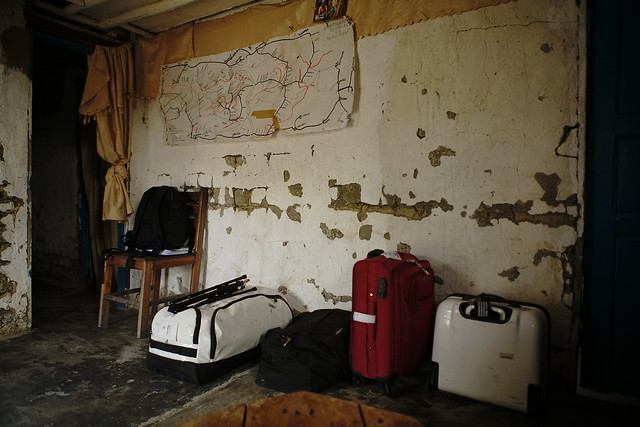How the EU is helping one world's most complex humanitarian crises
The fight for control of natural resources and ethnic conflict in Democratic Republic of the Congo (DRC) have created one of the world’s most complex humanitarian crises. Access is a key challenge to those trying to manage emergencies. The country’s infrastructure is limited and often under the control of militias. The EU humanitarian air service ECHO Flight brings NGO workers to where help is needed the most.
We joined Marianne Theis from the NGO Premiere Urgence Internationale on her trip to her base in the province of Nyunzu.
“There are real problems accessing the area,” she told Euronews. “The ECHO Flight service allows us to transport people and goods and materials, like medicine and everything we need to complete our work.”
 The European Commission’s Echo Flight service has six planes in three countries, half of them in DRC. The EU also funds aircraft to deliver life-saving aid to other conflict zones.
The European Commission’s Echo Flight service has six planes in three countries, half of them in DRC. The EU also funds aircraft to deliver life-saving aid to other conflict zones.
“The fleet has grown according to need,” said Sandrine Ducroix from EU Humanitarian Aid. “Now we have three planes here. Echo Flight supports its NGO partners with regular flights, flights on demand and medical evacuation or security evacuation flights when they’re needed in the field.”
With
NRC_Norway</a>, helping the displaced in the Democratic Republic of Congo rebuild their lives:<a href="https://t.co/p5q1WSJmoM">https://t.co/p5q1WSJmoM</a></p>— EU Humanitarian Aid (eu_echo) November 4, 2015
Flight from Nyunzu to Luizi
From Nyunzu, it takes about two hours on a narrow jungle trail to reach Luizi. The village is home to around 20,000 displaced people who fled from violence between Pygmy and Bantu tribes. We passed several burned-out villages. Marianne went to check in on the NGO’s mobile clinic which was set up last September. It opens twice a week.
“We opened this clinic here because it was a major displacement site,” said Theis.“People receive free health care, especially children under five who are more vulnerable, and also malnourished children, who also receive food rations. Every week we see around 200 people.”
3 unforgettable days on #echo #flights in #DRC w/
eu_echo</a> <a href="https://twitter.com/ACTED">ACTED bringing humanitarian aid to remote displacement areas pic.twitter.com/TnWyvvyGl1— Monica Pinna (@_MonicaPinna) November 13, 2016
Measles and malnutrition are common here. Francine is two and a half years old. Her mother brought her here last September from a village about 30 kilometres away. They sleep outdoors and they are both sick.
Mamba Bi Mloko, who has been internally displaced, told Euronews why she is here.
“I left because there were too many deaths in my village, which was attacked by the Pygmies. My brother was killed. Conditions here are miserable, but we have no choice.”
Health care and food assistance are central to the humanitarian effort. We saw how mobile clinics provide basic treatment to entire villages on the move; next we’ll go to South Kivu to see how a food fair can help internally displaced people and boost the local economy.
The flight to South Kivu, takes around two hours. We’re here to meet Suleymane and his team from the NGO ‘Acted’ in Kolula. They are for to organise a food fair.
Anne & Sheila #echoflight #bushpilots took us to #kolula. The fight to control nearby mines causes clashes and displacement
eu_echo</a> <a href="https://twitter.com/ACTED">ACTED pic.twitter.com/JT5HFj9AEW— Monica Pinna (@_MonicaPinna) November 13, 2016
For the pilots, landing in this insecure area is one of their biggest challenges.
“In this region displacement is caused by the armed conflict between government forces and the self-defence militias. People are constantly on the move,” said Soulemane Cissoko from Acted.
The NGO team flew to Kolula several times to identify the most vulnerable families. In the end 15,000 displaced people from nearby villages were given vouchers which could be exchanged for food at this fair. The vendors are all local businesses who had submitted tenders.
“Nineteen sellers were chosen, from the original 50,” one market trader told us.
After our visit, both Nyunzu and Kolula suffered further attacks. The volatile security situation makes this sort of humanitarian assistance vital.
Take a look at this beautiful photostory about our work with
eu_echo</a> delivering humanitarian aid to remote villages <a href="https://t.co/gTEKnXmXiv">https://t.co/gTEKnXmXiv</a></p>— Medair DR Congo (Medair_DRC) January 10, 2017











